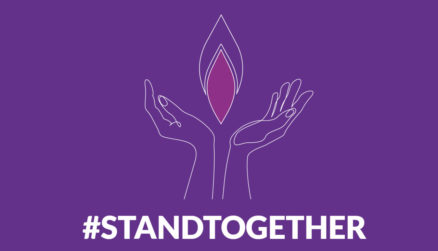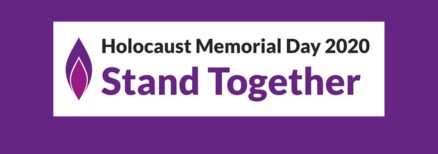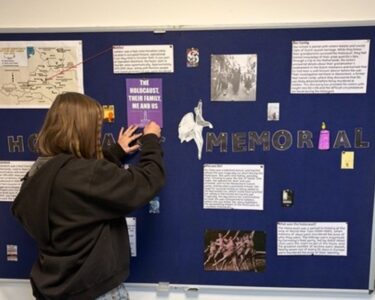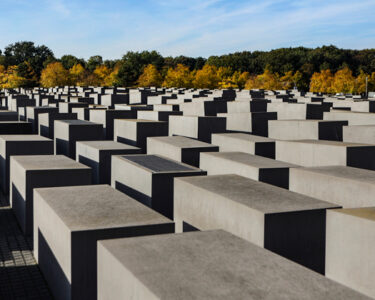As the Centre’s Executive Director, Professor Stuart remarks,
‘We live in increasingly troubled times. A sharp rise in, antisemitism, hate crime, Islamophobia, extremism and other acts of intolerance, prejudice and discrimination pose a real threat to our cherished democracy and civil society. This year’s HMD theme, ‘Stand Together’ is apposite because it offers a powerful reminder to individuals, organisations and government of the urgent need to collectively challenge and ‘stand up’ to these poisonous influences. In particular, the UCL Centre for Holocaust Education is committed to supporting schools, teachers and the communities and children they serve in confronting these serious threats. More than 12,000 teachers have participated in our courses. Across the country we continue to equip a diverse range of educators with the skills, resources, understanding and pedagogical expertise to address the challenges we face today. We are proud to ‘stand together’ with these teachers and their students to ensure we live in a more knowledgeable, tolerant and empathetic society.’
As we approach Holocaust Memorial Day on 27 January, the Centre encourages teacher colleagues, friends and partners to take some time to reflect on the overarching theme of this year’s commemorations: ‘Stand Together’. To this end, we are delighted to share a selection of writings which have been authored to mark Holocaust Memorial Day 2020.
Last year’s HMD theme was ‘Torn from Home’. The idea of home is one which, for many of us, evokes strong emotions. In the process of our evolution, such spaces have offered shelter and protection, enabling us to exist within our environments. Building a home, in a literal sense, has therefore been integral to our survival as a species. Of equal importance are the processes of making a home and feeling at home. Here, home is more than simply a physical construction which offers safety and security; it is also a place where we feel comfortable and content, and duly able to live our lives. For these reasons, amongst others, the prospect of having “home” forcibly taken away from or denied to us is something which we instinctively rile against. Sadly, acts of human atrocity such as war and genocide invariably see such things occur. In these cases, something more than places of habitation are destroyed and the need for Standing Together – the 2020 theme – is all the more acute.
In the 1930s, the policies of Nazi Germany against Jewish men, women, and children within its borders created immense upheaval, dislocation, and – increasingly – displacement. As a young boy, Lord Alf Dubs experienced this first-hand following the arrival of the Nazis in Czechoslovakia in 1938. A year later, Dubs was fortunate enough to be able to leave the country and find refuge in England under the Kindertransport programme. In this moving piece, written originally for the Centre to mark Holocaust Memorial Day in 2019, Dubs reflects upon his personal experience of being torn from home and how it has shaped his concern for refugees today. Republished with his permission today, Dubs’ words also compel us to ‘stand together’.
Someone else touched by the plight of refugees and marginalized groups today, also known to Lord Dubs, and committed to ‘standing together’ is the daughter, Barbara, of his rescuer, Sir Nicholas Winton.
Today, Barbara Winton has written these recollections on her fathers’ pre and post-war experiences. Poignantly, Barbara recounts how her father appealed to the British public for support for his endeavor to rescue the children, and relates how Lord Dubs and others are trying to honour his memory in their ‘standing together’ with child refugees today. Both Lord Dubs and Barbara share a care and understanding of the reality faced by refugees. They recognise the trauma and rupture of being initially ‘torn from home’ had only been intensified by the destruction of the very idea of home.
In deepening our awareness of the experiences like Lord Dubs and the case of Sir Nicholas Winton, and in taking on Barbara’s insight, we move towards developing a more rounded understanding of the human consequences that flow from persecution, discrimination, and genocide. In so doing, we also deepen our knowledge of what these phenomenon are and what they entail. Someone who has worked tirelessly towards such ends is Gregory Stanton, whose model outlining the stages that genocide commonly proceeds through has – regrettably – been borne out in reality on more than one occasion. We live in dangerous times. We know the scourge of antisemitism is rising, that hate crime is on the increase and that our communities, local, national and global, are fractured due to ‘them and us’ thinking, political, social, racial, religious and economic factors. Those issues are real and they do not stop at the school gates or at the classroom door.
As we approach this year’s Holocaust Memorial Day and consider its theme ‘Stand Together’, the Centre is both privileged and honoured to partner with 1,000 of teachers across the country and our 138 Beacon Schools. Increasingly schools are approaching us for support regards antisemitism in their communities, safeguarding concerns regards the far right or left in their communities, and Lord Dubs and Barbara’s pieces touch upon some of the elemental challenges that the Holocaust and its legacies continue to pose. In a reflective piece, drawing on personal insight and latest research, the Centre’s Dr Alice Pettigrew contextualizes her standing together with the Centre and the landscape of Holocaust teaching and learning over the past ten years.
From our research and our experience we know that the accounts of survivors, like Leon Greenman, who in his 80s fought against rising racism and fascism in London, who stood together and marched for others human rights, that the Holocaust’s history has stark and powerful meaning for today and the future. This can have a profound impact on students, and can serve as a vital resource for teaching and learning about the Holocaust, but also make a vibrant contribution to safeguarding, SMSC, emotional and religious literacy. Today, a growing number of schools choose to pursue Holocaust education through a whole-school approach – with Holocaust Memorial Day acting as an important marker in cultivating awareness and participation.
One of the Centre’s long-standing friends and inspiration is Sir Ben Helfgott – Ben has influenced our work considerably. When we established the UCL Centre for Holocaust Education 10 years ago he was always on the end of the phone advising us, helping us, pummelling us with questions that would help us shape our vision and rationale. Ben was a persuasive voice in the battle to get the Holocaust on the English National Curriculum and works tirelessly to ensure survivors receive compensation and restitution from the German government – not that anything could ever compensate for such loss. In this short statement, Ben reflects on his life and mission and the need to ‘Stand Together’.
He harbours no hate. In fact Ben’s most remarkable work is arguably his ongoing efforts to build bridges between the Poles and the Jews; never faltering in remembering the past but actively working towards building a constructive future.
The challenges, opportunities, and potential benefits that can come through these approaches are discussed in this final piece by George Croxford, Headteacher of Royal Wootton Bassett Academy. As George shows school leaders have an important role in marking Holocaust Memorial Day, especially in our Beacon Schools. His school-based reflections speak to the sometimes-difficult relationship of commemoration and education but demonstrates just what Holocaust Memorial Day can to focus a school community and enhance provision and practice.
*The UCL Centre for Holocaust Education will be marking Holocaust Memorial Day in a small ceremony on 23 January, and representatives will be attending the national ceremony organised by our friends The Holocaust Memorial Day Trust, on 27 January





